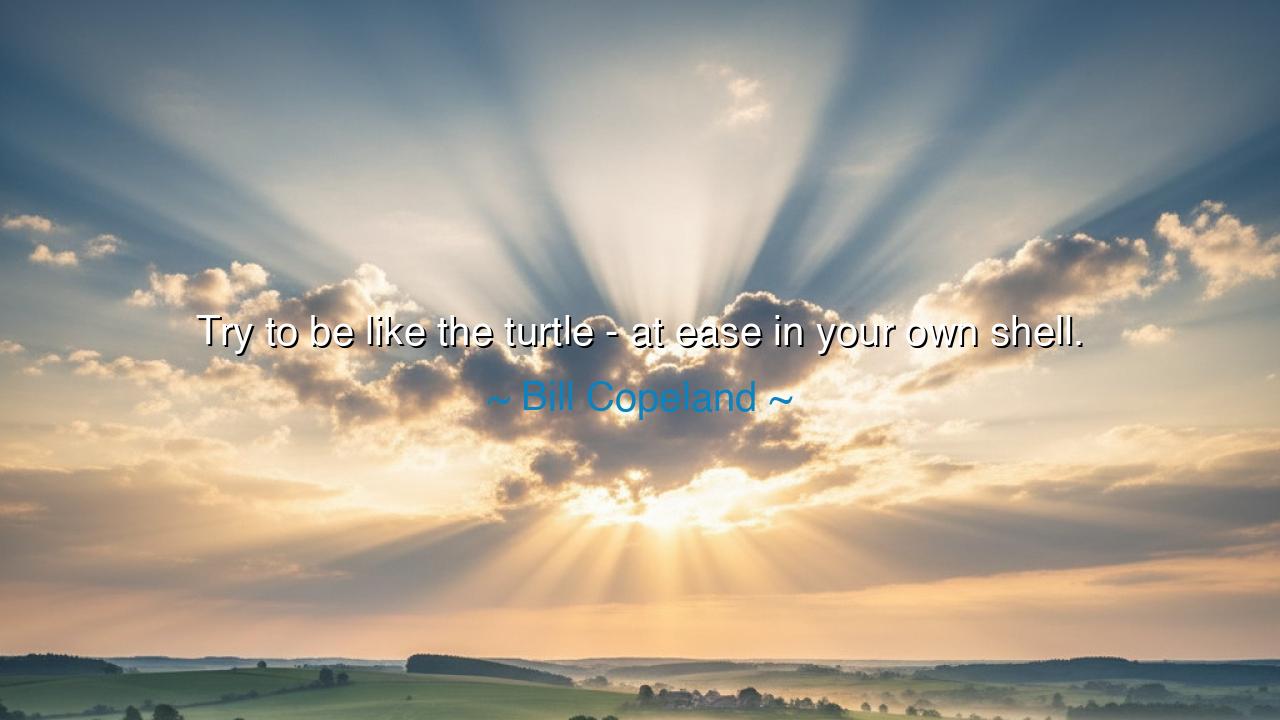
Try to be like the turtle - at ease in your own shell.






“Try to be like the turtle — at ease in your own shell.” — so spoke Bill Copeland, a poet and thinker of gentle wisdom, whose words remind us of one of life’s quietest but most powerful truths: peace begins within. In this simple image of the turtle — slow, steady, and content in its shell — he offers a teaching as ancient as the earth itself. The turtle does not rush, nor does it envy the wings of birds or the speed of beasts. It carries its home upon its back, finding safety and serenity wherever it goes. To be like the turtle, then, is to find comfort in one’s own being, to dwell in oneself with calm acceptance, and to journey through life unhurried by comparison or fear.
The ancients would have called such wisdom the path of self-harmony — the state where one’s inner world is at peace regardless of what storms rage outside. For the turtle’s shell is not only its protection but its symbol of self-sufficiency. It teaches that every human soul must learn to build its own sanctuary within. Those who depend on the shifting approval of the world are forever homeless in spirit. But those who are at ease in their own shell carry peace wherever they go, for they have made a dwelling in their own hearts.
Bill Copeland’s words arise from a deep well of human truth, one that philosophers, sages, and poets have drawn from since the dawn of time. In a world that moves with great noise and haste, we are often taught to look outward — to seek validation, possessions, and praise. But the turtle reminds us of the opposite path: to turn inward, to listen to the still voice within. True strength is not found in speed or display, but in the calm assurance of knowing who you are. To be at ease in your own shell is not to be idle or indifferent; it is to be grounded, unshaken, and inwardly whole.
History offers us many who embodied this truth. Consider Mahatma Gandhi, who lived in simplicity though the world looked to him as a giant. His possessions were few — a shawl, a staff, a pair of sandals — yet his spirit carried an entire nation’s hope. He was at ease in his own shell, unmoved by luxury or power, content to be guided by his conscience alone. Even when imprisoned, he was free, for his peace came not from his surroundings but from within. Like the turtle, Gandhi carried his home — the home of truth and self-knowledge — wherever he went. And in that quiet strength, he found the power to change the world.
To live in such a manner requires courage. For it is easier to flee into distraction than to sit alone in the silence of one’s own shell. The modern soul fears stillness, mistaking it for emptiness. Yet the turtle knows that stillness is life’s deepest rhythm. When we slow down, when we listen, when we dwell quietly in ourselves, we rediscover the voice of the spirit — that voice which whispers who we truly are. Self-acceptance is not a gift we find; it is a discipline we cultivate. It is the art of embracing our own nature without shame, of finding beauty in our own pace, our own path, our own form.
There is also humility in the turtle’s lesson. It does not race against the rabbit, nor does it seek applause for its journey. It moves according to its nature — steady, patient, persistent. And though it moves slowly, it always arrives. To be like the turtle is to reject the false urgency of the world, to live not in competition but in quiet purpose. Such a life is not small — it is wise. The turtle reminds us that peace and progress are not enemies: one who walks with calm heart often reaches farther than one who runs in haste.
So, child of the restless age, take this teaching to heart: Be at ease in your own shell. Do not long to shed your nature for another’s. Do not measure your worth by the noise of others’ journeys. Instead, learn to befriend yourself. When you rise each morning, speak gently to your soul; when you falter, offer yourself compassion; when you rest, let gratitude fill your heart. For in this way, you build a home within — a place of calm that no storm can touch.
And when you have found that peace, carry it with you as the turtle carries its shell — lightly, faithfully, always. Walk through the world not as one seeking to prove, but as one content to be. Then you will know the quiet strength that Copeland spoke of, and your life will move not with anxiety, but with grace. For to be at ease in your own shell is to live in harmony with yourself — and that, above all else, is the beginning of wisdom.






AAdministratorAdministrator
Welcome, honored guests. Please leave a comment, we will respond soon